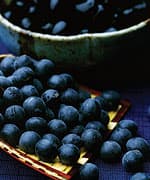Life Extension Magazine®
Today, more and more health-conscious adults are discovering the health-enhancing properties of blueberries. New studies confirm that these delicious berries are one of the most promising nutritional agents available for fighting the effects of aging, conferring benefits that range from helping protect against cancer to preserving youthful-looking skin.1,2 However, the most profound health effect associated with blueberries may well be their remarkable ability to protect the brain from the degenerative effects of aging and even injury. Blueberries are loaded with powerful antioxidant compounds known polyphenols that protect brain cells against damaging inflammation and oxidative stress, and can arrest and even reverse age-related decline in cognitive and motor functions.3-5 These phenolic compounds include anthocyanins, which are particularly beneficial for brain health.3,4,6 Blueberries Benefit Memory and CognitionFree radical attack on brain cells is an important contributor to age-related cognitive decline.7 In experiments with laboratory animals, plant-derived antioxidants such as those contained in blueberries effectively reversed age-related decline in memory and cognition.8 Additional laboratory evidence demonstrates that increasing dietary intake of blueberries and other antioxidant-rich fruits and vegetables helps maintain optimal brain cell function and cognition well into old age.9-11 Just two years ago, scientists discovered that feeding blueberries to aging rats protected them from age-related memory loss. In fact, when blueberry-supplemented old rats were tested for object recognition memory, their scores resembled those of young rats. This stunning findings suggests that consuming blueberries may literally help to turn back the clock, restoring youthful levels of function in the aging brain.10 Blueberries may work by influencing a region of the brain called the hippocampus, which is primarily responsible for short-term memory. Scientists have found that feeding blueberries to older animals helps to maintain high levels of new cell generation in the hippocampus, which may help to preserve sharp memory function.12 These findings are supported by other studies indicating that blueberry extracts help prevent memory deficits in adult rats.13 Some evidence suggests that blueberries exert their powerful effects on brain health by crossing the blood-brain barrier, a highly selective membrane that determines which blood-borne substances gain access to the brain. One of the challenges faced in developing effective treatments for brain disorders is that very few substances can cross this almost impenetrable barrier. However, after rats consumed a blueberry-supplemented diet, numerous blueberry-derived phytochemicals were found throughout their brains. These blueberry constituents were especially concentrated in areas of the brain related to learning and memory, suggesting that these phytochemicals may benefit these crucial aspects of cognitive function.3
Countering Stroke-Induced Brain Damage
Stroke is one of the most dreaded and disabling of all health conditions. Most strokes are acute ischemic strokes, in which a blockage in blood vessels to the brain interrupts the delivery of oxygen- and nutrient-rich blood. Tissue damage ensues immediately from this oxygen deprivation, and the damage continues even after blood flow is restored, due to a rapid influx of damaging reactive oxygen species into the brain.16 Antioxidants in blueberries may counter stroke-induced tissue damage, since they rapidly neutralize destructive free radicals and protect against ischemic damage.17 Since blueberries are one of nature’s richest sources of antioxidants, many researchers have sought to determine whether they might help avert the dangers of deadly strokes. Just last year, a research team examined blueberries’ protective effects against stroke-induced brain damage. They found that laboratory rats that were fed a diet fortified with blueberries were far less vulnerable to the effects of experimentally induced ischemic stroke than were animals that had not consumed blueberries. Following an induced stroke, the blueberry-fed rats showed much smaller areas of brain damage as well as improved movement compared to the control group.18 These findings suggest that regular consumption of blueberries may confer significant neuroprotection against the disabling effects of stroke. In a similar animal study, blueberries helped protect cells of the brain’s memory center—the hippocampus—against damage caused by ischemic stroke. These findings led researchers to suggest that incorporating blueberries in the diet could help improve the outcomes of acute ischemic stroke.19 Blueberries May Prevent Alzheimer’s DiseaseAlzheimer’s disease, the most common form of age-related dementia, progressively robs people of their memory and independence. While its precise cause is unknown, scientists believe that oxidative stress contributes to brain cell damage, leading to memory loss and an inability to process new information.20 Since blueberries have a protective effect on memory, scientists investigated whether they also protect against Alzheimer’s. For this experiment, researchers studied rats with a genetic susceptibility to developing the disease. Astonishingly, they found that a blueberry-supplemented diet caused rats suffering from Alzheimer’s-like symptoms to perform normally on tests of memory and motor behavior. The researchers concluded that a diet that includes blueberries may help prevent Alzheimer’s, even in those who have a genetic predisposition to the disease.20 Blueberries may also support the brain’s natural protective mechanisms against stress. When blueberry-fed rats were exposed to an inflammation-provoking toxin, they produced more of a brain-protective protein than did rats that did not eat blueberries. This effect suggests that blueberry supplementation may protect the nervous system against conditions related to oxidative stress and inflammation, such as Alzheimer’s and Parkinson’s disease.21
Protecting Against Parkinson’s DiseaseWhile Alzheimer’s is a robber of memory, Parkinson’s disease impairs one’s ability to move freely and easily.22 Parkinson’s patients suffer a progressive loss of movement control due to damage in the coordination centers of the brain, especially to cells that produce the neurotransmitter dopamine. As with Alzheimer’s disease, substantial evidence suggests that oxidative stress and increased inflammatory responses play a role in Parkinson’s disease.23,24 Scientists searching for ways to fight Parkinson’s disease are keenly interested in the antioxidant powers of polyphenols contained in fruits such as blueberries. They have tested various flavonoid components to assess their protective effects against oxidative stress and cellular death in dopamine-producing brain cells.25 Treating dopamine-producing cells from motion-control regions of the brain with flavonoids prior to oxidative damage conferred protection against injury and resulted in an increased rate of cell survival. This led the investigators to conclude that flavonoid molecules, such as those found in blueberries, show promise in protecting against the early effects of Parkinson’s disease. Fresh Blueberries Versus Blueberry ExtractsFresh blueberries may not be readily available year-round. Moreover, even people who love the taste of this delicious fruit may find it difficult to eat blueberries every day. Therefore, scientists have investigated whether blueberry extracts provide all the brain-boosting benefits of blueberries. They found that ingesting blueberry extracts does in fact provide the same anti-inflammatory and antioxidant benefits gained from eating the whole fruit.31 ConclusionNew findings suggest that blueberries naturally confer a wealth of health-protective benefits. Rich in antioxidants that combat oxidative stress and inflammation, blueberries and blueberry extracts may help to preserve youthful cognitive function and protect against disabling neurodegenerative diseases and crippling strokes. Moreover, a steady stream of emerging research suggests that blueberries may offer a broad array of additional health benefits, such as protecting against cancer, supporting cardiovascular health, and promoting youthful skin. Ongoing research is likely to uncover even more health benefits associated with this delicious fruit. | ||||||
| References | ||||||
| 1. Schmidt BM, Erdman JW JR, Lila MA. Differential effects of blueberry proanthocyanidins on androgen sensitive and insensitive human prostate cancer cell lines. Cancer Lett. 2006 Jan 18;231(2):240-6. 2. Segger D, Schonlau F. Supplementation with Evelle improves skin smoothness and elasticity in a double-blind, placebo-controlled study with 62 women. J Dermatolog Treat. 2004 Jul;15(4):222-6. 3. Andres-Lacueva C, Shukitt-Hale B, Galli RI, Jauregui O, Lamuela-Raventos RM, Joseph JA. Anthocyanins in aged blueberry-fed rats are found centrally and may enhance memory. Nutr Neurosci. 2005 Apr;8(2):111-20. 4. Lau FC, Shukitt-Hale B, Joseph JA. The beneficial effects of fruit polyphenols on brain aging. Neurobiol Aging. 2005 Dec;26 Suppl 1:128-32. 5. Bonnefoy M, Drai J, Kostka T. Antioxidants to slow aging, facts and perspectives. Presse Med. 2002 Jul 27;31(25):1174-84. 6. Ehlenfeldt MK, Prior RL. Oxygen radical absorbance capacity (ORAC) and phenolic and anthocyanin concentrations in fruit and leaf tissues of highbush blueberry. J Agric Food Chem. 2001 May;49(5):2222-7. 7. Meydani M. Nutrition interventions in aging and age-associated disease. Ann NY Acad Sci. 2001 Apr;928:226-35. 8. Bickford PC, Gould T, Briederick L, et al. Antioxidant-rich diets improve cerebellar physiology and motor learning in aged rats. Brain Res. 2000 Jun 2;866(1-2):211-7. 9. Galli RL, Shukitt-Hale B, Youdim KA, Joseph JA. Fruit polyphenolics and brain aging: nutritional interventions targeting age-related neuronal and behavioral deficits. Ann NY Acad Sci. 2002 Apr;959:128-32. 10. Goyarzu P, Malin DH, Lau FC, et al. Blueberry supplemented diet: effects on object recognition memory and nuclear factor-kappa B levels in aged rats. Nutr Neurosci. 2004 Apr;7(2):75-83. 11. Joseph JA, Shukitt-Hale B, Denisova NA, et al. Reversals of age-related declines in neuronal signal transduction, cognitive, and motor behavioral deficits with blueberry, spinach, or strawberry dietary supplementation. J Neurosci. 1999 Sep 15;19(18):8114-21. 12. Casadesus G, Shukitt-Hale B, Stellwagen HM, et al. Modulation of hippocampal plasticity and cognitive behavior by short-term blueberry supplementation in aged rats. Nutr Neurosci. 2004 Oct;7(5-6):309-16. 13. Ramirez MR, Izquierdo I, do Carmo Bassols RM, et al. Effect of lyophilised Vaccinium berries on memory, anxiety and locomotion in adult rats. Pharmacol Res. 2005 Dec;52(6):457-62. 14. Bickford PC, Shukitt-Hale B, Joseph J. Effects of aging on cerebellar noradrenergic function and motor learning: nutritional interventions. Mech Ageing Dev. 1999 Nov;111(2-3):141-54. 15. Stromberg I, Gemma C, Vila J, Bickford PC. Blueberry- and spirulina-enriched diets enhance striatal dopamine recovery and induce a rapid, transient microglia activation after injury of the rat nigrostriatal dopamine system. Exp Neurol. 2005 Dec;196(2):298-307. 16. Bazan NG, Marcheselli VL, Cole-Edwards K. Brain response to injury and neurodegeneration: endogenous neuroprotective signaling. Ann NY Acad Sci. 2005 Aug;1053:137-47. 17. Polidori MC, Mecocci P, Frei B. Plasma vitamin C levels are decreased and correlated with brain damage in patients with intracranial hemorrhage or head trauma. Stroke. 2001 Apr;32(4):898-902. 18. Wang Y, Chang CF, Chou J, et al. Dietary supplementation with blueberries, spinach, or spirulina reduces ischemic brain damage. Exp Neurol. 2005 May;193(1):75-84. 19. Sweeney MI, Kalt W, MacKinnon SL, Ashby J, Gottschall-Pass KT. Feeding rats diets enriched in lowbush blueberries for six weeks decreases ischemia-induced brain damage. Nutr Neurosci. 2002 Dec;5(6):427-31. 20. Joseph JA, Denisova NA, Arendash G, et al. Blueberry supplementation enhances signaling and prevents behavioral deficits in an Alzheimer disease model. Nutr Neurosci. 2003 Jun;6(3):153-62. 21. Galli RL, Bielinski DF, Szprengiel A, Shukitt-Hale B, Joseph JA. Blueberry supplemented diet reverses age-related decline in hippocampal HSP70 neuroprotection. Neurobiol Aging. 2006 Feb;27(2):344-50. 22. Pollack P, Gaio JM, Perret J. Parkinson’s disease and parkinsonian syndromes. Rev Prat. 1989 Mar 9;39(8):647-51. 23. Bastianetto S, Quirion R. Natural antioxidants and neurodegenerative diseases. Front Biosci. 2004 Sep 1;9:3447-52. 24. Esposito E, Rotilio D, DiMatteo V, et al. A review of specific dietary antioxidants and the effects on biochemical mechanisms related to neurodegenerative processes. Neurobiol Aging. 2002 Sep;23(5):719-35. 25. Mercer LD, Kelly BL, Horne MK, Beart PM. Dietary polyphenols protect dopamine neurons from oxidative insults and apoptosis: investigations in primary rat mesencephalic cultures. Biochem Pharmacol. 2005 Jan 15;69(2):339-45. 26. McAnulty SR, McAnulty LS, Morrow JD, et al. Effect of daily fruit ingestion on angiotensin converting enzyme activity, blood pressure, and oxidative stress in chronic smokers. Free Radic Res. 2005 Nov;39(11):1241-8. 27. Matchett MD, MacKinnon SL, Sweeney MI, Gottschall-Pass KT, Hurta RA. Blueberry flavonoids inhibit matrix metalloproteinase activity in DU145 human prostate cancer cells. Biochem Cell Biol. 2005 Oct;83(5):637-43. 28. Olsson ME, Gustavsson KE, Anderson S, Nilsson A, Duan RD. Inhibition of cancer cell proliferation in vitro by fruit and berry extracts and correlations with antioxidant levels. J Agric Food Chem. 2004 Dec 1;52(24):7264-71. 29. Yi W, Fischer J, Krewer G, Akoh CC. Phenolic compounds from blueberries can inhibit colon cancer cell proliferation and induce apoptosis. J Agric Food Chem. 2005 Sep 7;53(18):7320-9. 30. Kowalczyk E, Krzesinski P, Kura M, Szmigiel B, Blaszczyk J. Anthocyanins in medicine. Pol J Pharmacol. 2003 Sep-Oct;55(5):699-702. 31. Joseph JA, Shukitt-Hale B, Casadesus G. Reversing the deleterious effects of aging on neuronal communication and behavior: beneficial properties of fruit polyphenolic compounds. Am J Clin Nutr. 2005 Jan;81(1 Suppl):313S-6S. |


